August 24, 1900
On Tuesday, comes the celebration proper and much will be crowded into the day. The committee has asked The Boston Herald to call attention to one matter and the and the observance of the suggestion will make everyone comfortable, and it non-observance will make just the reverse condition. The town is a small country village, several mile from the railroad. Its spirit of hospitality is greater than its capacity of entertainment. The straightforward announcement is therefore made, that will be impossible to take care of them over night, Accordingly, the hours for Tuesday have been set so that those who come on the morning train at Greenville may enjoy the entire day's doings and may leave for home on the afternoon train, losing nothing of interest or value. There is but one hotel, and this with the hospitality already in the homes of the residents, makes it impossible to assure accommodations for the night to any who are not specifically provided for. Tuesday morning at 9 o'clock a parade will start in front of Clark's Hotel, headed by Gov. Frank W. Rollins, his adjutant-general and six of his staff, escorted by the Peterboro cavalry, Lyndeboro artillery, Battery B, Band of Worcester, Mass., Jonas Nutting Post, G. A. R., the fire company and local organizations. The president of the day, the Hon. John L. Hildreth. M. D., of Cambridge, will also be escorted. The chief marshal will be Lauriston M. P. Hardy and his aids will be Albert F. Walker and Wilbur L.. Phelps. Phelps. The literary exercises will be in the Congregational church after the parade. The Temple Quartet of Boston will sing and there will be sundry addresses. Dr. Hildreth will preside and there will be an historical address by Prof. Charles H. Chandler of Ripon College, Wisconsin, and a poem by Mr. Timothy Perry of Brooklyn, N. Y. Perry of Brooklyn, N. Y. The dinner will be served in a great tent on the campus of Appleton Academy, at the conclusion of the literary exercises. In the evening there will be a reception to Gov. Rollins in Appleton Academy, followed by dancing. In the preparation of all these things this committee has been at work for many weeks: Wilbur L. Phelps, Joseph A. Wheeler, Edward O. Marshall, John Preston, H. J. Moore, George R. Barrett, Frederick W. Jones, Albert J. Walker, L. M. P. Hardy, Charles Wheeler, George S. Wheeler and Miss C. F. Barr. The town of New Ipswich today is given to farming with some small manufacturing carried on in it. But the greatest charm it has is in its hospitable people, and it is fast becoming a place of residence for its former children and others who come summers to spend the heated days in the quiet village or on the beautiful slopes of its many hills. The town is charmingly pretty. Historically there is little to see. The town is, however, the home of a new institution that is making it known in Boston through the efforts of the Rev. George J. Prescott of Boston, rector of the Church of the Good Shepherd, who has established "The Homestead Inn," where working girls from Boston have an opportunity to come for a few weeks each and get out of the din, dust and danger of city life, to which their hard work and small pay expose them. The "Inn" is a large, old-fashioned house, which has been added to to adapt it to its new needs and uses. The place is maintained by donations from wealthy people whom Mr. Prescott has interested, and is non-sectarian in so far as any effort is made to impress the girls, though the rector and the sisters who have charge of the school are of the Episcopal church. There is a chapel where attendance is required weekly. Mr. Prescott and the sisters have daily • devotions therein. Sister Katherine is the spirit of the Inn, and is beloved of the girls, and of the townspeople as well, who have found her to be a noble and lovely character whom it is benediction to meet and know. The town is widely known through its famous Appleton Academy, and in the days when these old-fashioned New England schools were at their eminence the school graduated men and women whose training has been formative and influential all over the country. Out- classed by the rich schools of the cur- rent times, Appleton offers no such attractions of outfit and equipment as these great preparatory colleges, but it is still in session, and its fundamental instruction in the essentials of good education and high ideals is not surpassed by any academy or school anywhere. The town is the birthplace of many famous men, well known in various activities of life, and these names are frequently mentioned as those of men who have gone into the world and, in the making of their good names and reputations, have reflected credit and renown upon the town: The Hon. Rodney Wallace of Fitchburg, Mr. R. H. Stearns of Boston, Judge Chauncey Perry and the Hon. Timothy Perry of Brooklyn, N. Y., Prof. Charles H. Chandler of Ripon College, Mr. Benjamin Champney, the famous Boston artist; President C. S. Kendall of Wisconsin University, Dr. Cecil F. Bancroft of Phillips Andover Academy, Dr. J. L. Hildreth of Cambridge and others. New Ipswich is in Hillsboro county, 42 deg. 41 min. north and 71 deg. 50 min. west, on the southern line of the state, adjoining Massachusetts. Topographically the town is most varied in character, and is exceedingly picturesque. In 1621, King James of England granted to John Mason all the land between the Piscataqua and Naumkeag (Ports- mouth and Salem) and 60 miles into the interior. This town is in that grant. The town was settled 150 years ago, and there were 21 original proprietors, representing 18 shares. The perambulation of the town boundaries shows it touches Ashby and Ashburnham, Mass., and Rindge, Sharon, Temple and Mason, Ν. Η. The town records to the time the revolution afford but few incidents for history. In 1773 an "invoice" of the town showed this record: One hundred and sixty-nine male polls, three slaves, 201 oxen and horses, 267 cows, 246 young cattle, 18 acres of orchard, 3118 acres of pasturage, 881 acres of arable and mowing land; £66 lawful, the yearly income of stock in trade, money at interest, mills, etc.; inhabitants, 882. Preparations for its share in the rev- olution were taken or begun at a town meeting, Jan. 19, 1775. Dea. Isaac Ap- pleton was chosen a delegate to the convention to choose delegates to the American Continenal Congress in Philadelphia. The town authorized "such manual exercise" as the deputies think proper; it was voted to add one hundred and a half weight of powder and three hun- dred and one-half weight of lead to the town's stock. The Lexington alarm being received, the powder and lead were taken from the magazine, then situated on the beams of the meeting house, and distributed, and 150 men set out. This was the quick beginning, and sturdily was it kept up during the revolution. The first postoffice was established in 1800, and Samuel Batchelder was first postmaster. His first report to the government, Jan. 1, 1801, showed one letter received. The net proceeds to the federal department were 7 cents; Batchelder had 3. The receipts for the second year, ending Oct. 1, 1801, were $4.33. Fifty years later they were $521.08. The first meeting house was of hewn logs, built in 1748, and burned during the period of desertion of the settlement. The inevitable controversy that prevailed in those days occurred about a new meeting house, and in 1759 the building was raised. The third meeting house was raised in 1768. and in it the anniversary exercises are to be held.
Funeral Procession - September 1, 2024
A funeral procession for Captain James Feldhusen of the New Ipswich Fire Department was held on Sunday, September 1, 2024 at 13:00.
At this time, the family has opted to not publish an obituary or service information for their loved one.
James Roger diary entry
September 3rd 1908 (Thursday)
Fair and sunny. David, Royce & Whittemore repairing the cemetery roads. I filled Hall lamps and pulled some blueberries, also cut and trimmed some lots. Several Grangers fixing up Hall for Grange fair on Friday night. Ashby band teams passed tonight from Greenville to home. Had a hot box (?).
September 14, 2024 - 13:30
New Ipswich Historical Society cordially invites the public to its Annual Meeting and Program.
FINNS: An Oral History of Finnish-Americans
in New Hampshire’s Monadnock Region
Presented by Patricia Kangas Ktistes
New Ipswich Museum of History (72 Academy Road) - formerly Appleton Academy
Our 30-minute business meeting will be followed by this year’s featured speaker, Patricia Kangas Ktistes, who will describe her experience of interviewing Finnish-Americans in New Ipswich and surrounding communities for the purpose of preserving their stories for future generations.
In addition to sharing interesting anecdotes and audio clips that she collected for her Master’s thesis in the 1990s, Patricia will provide participants with her recommendations and useful tips for collecting family histories before elders pass and their knowledge and experiences are lost to time.
Patricia Kangas Ktistes was born in New Ipswich in 1952, and attended town schools through ninth grade. In 1967, she moved out of state with her family. In 1987, she earned a B.S. from Colby-Sawyer College and received her MALS degree at Dartmouth College in 1997. Her master’s thesis is entitled FINNS: An Oral History of Finnish-Americans in New Hampshire's Monadnock Region. Patricia has two daughters and five grandchildren; she and her husband John Ktistes reside in Rockport, MA
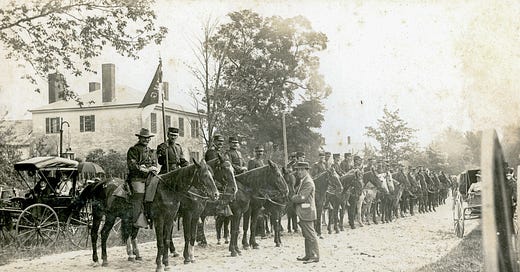


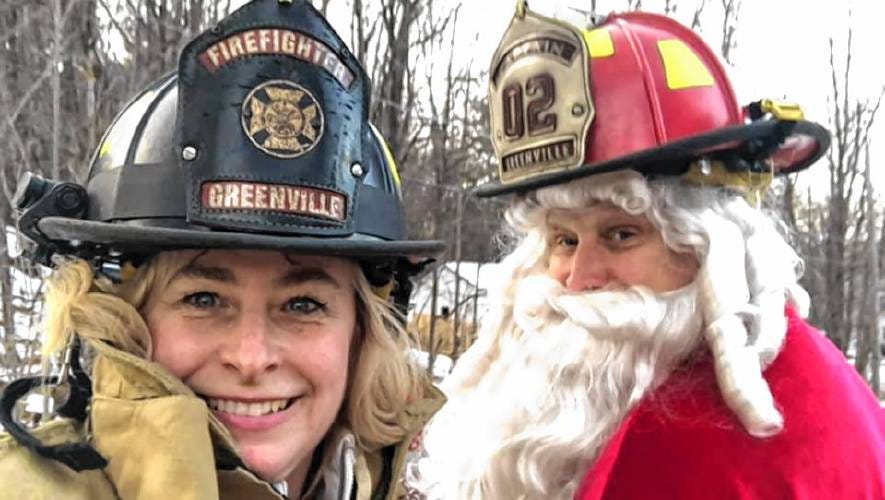
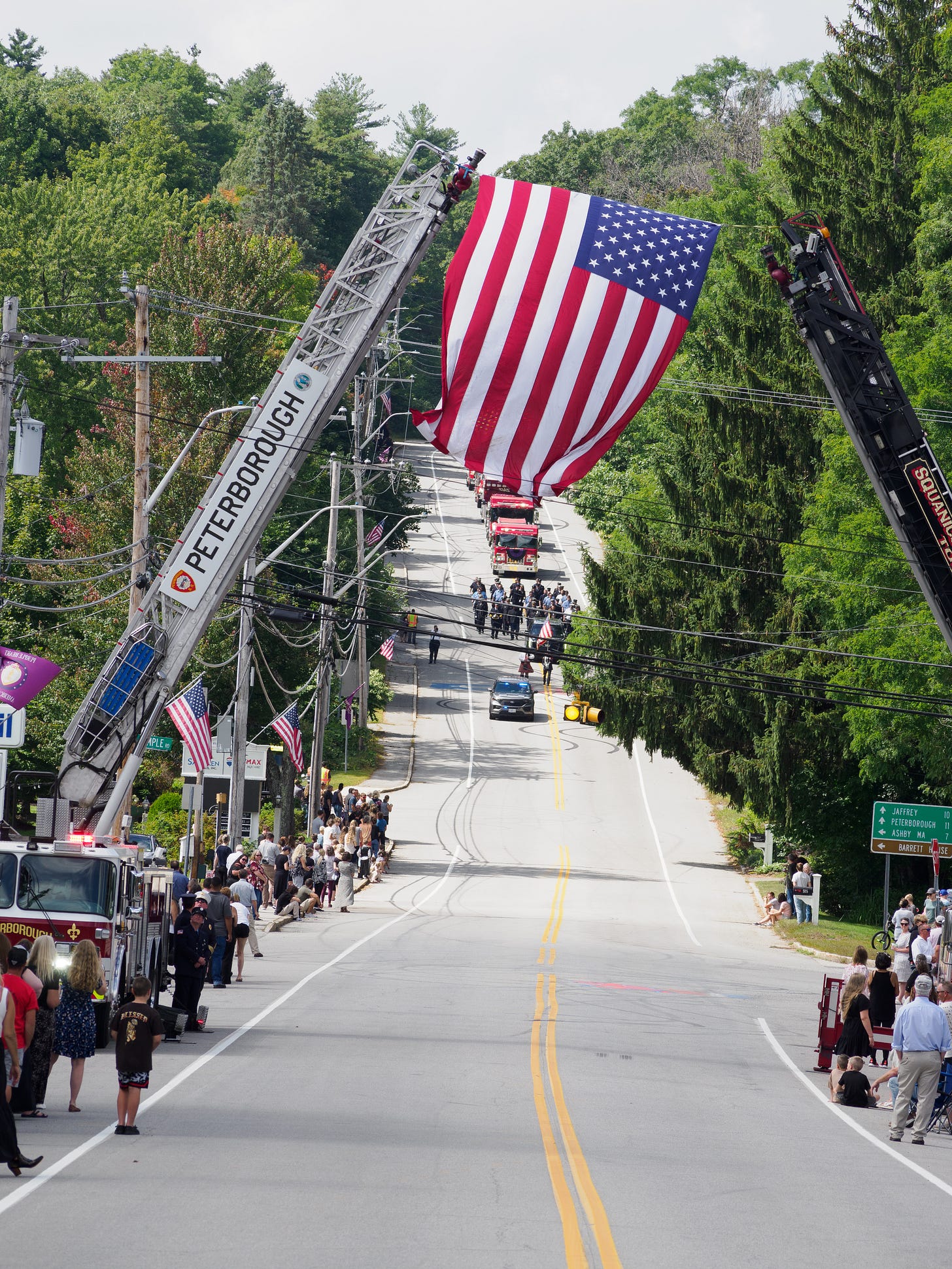

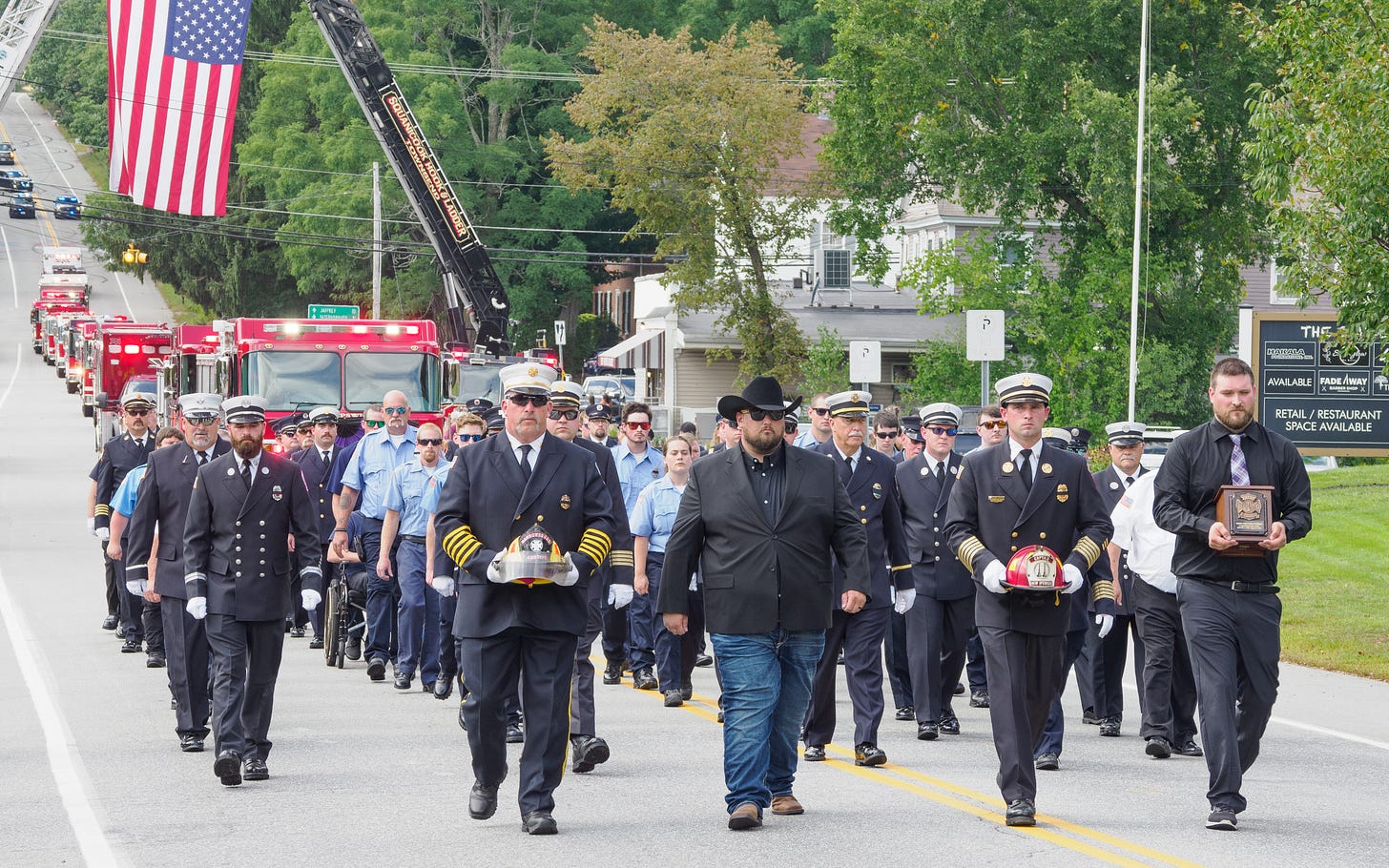
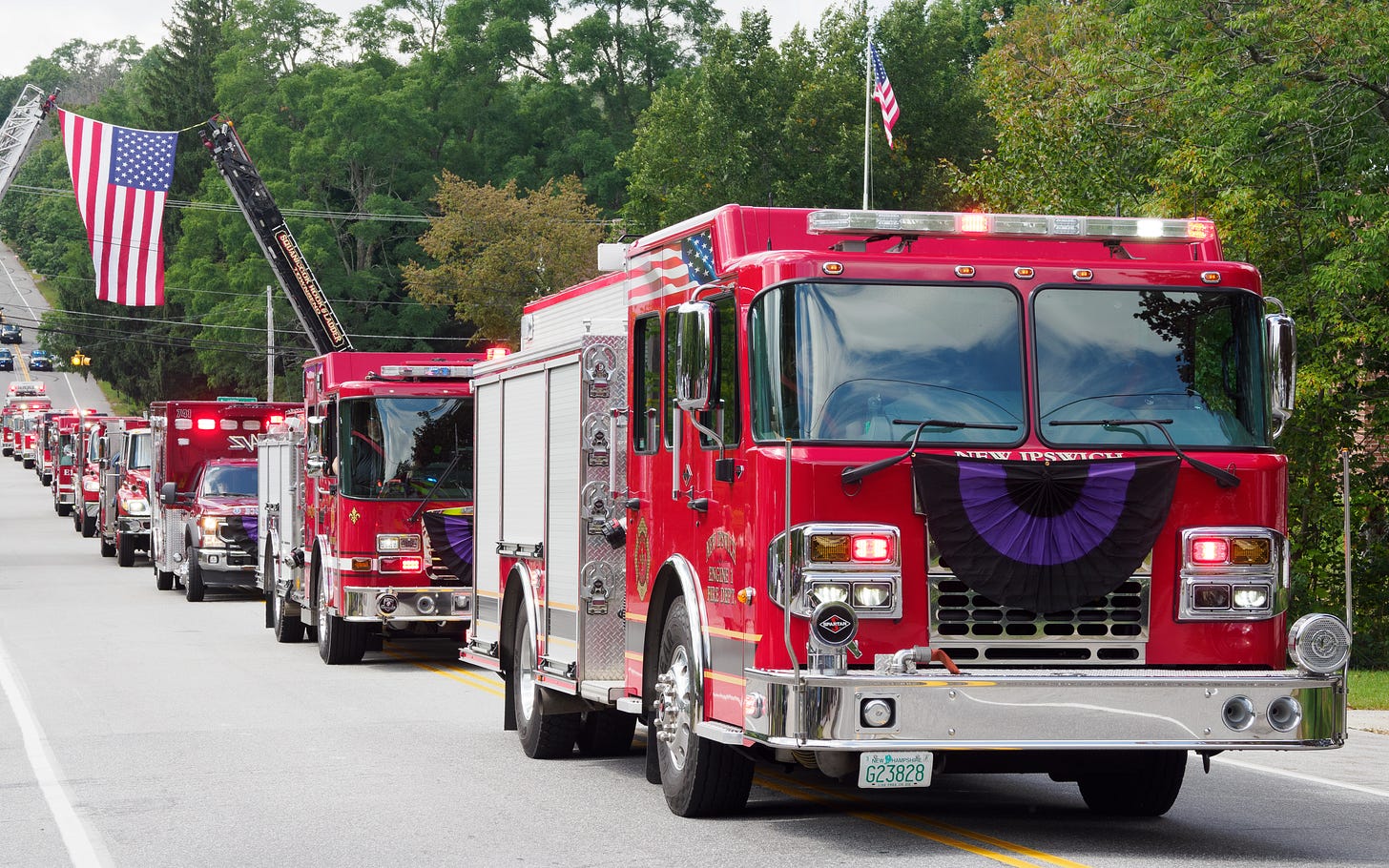
While working at the Center Cemetery last Friday I had a gentleman drive in who and stopped to ask me where he could meet the Cemetery sexton. He said his name was Chauncey Perry, a descendent of Judge Chauncey Perry. He was up from his home outside Boston to visit his family plot and see about getting some dates added to a few gravestones. He is I believe the 4th in his family to be named Chauncey Perry.